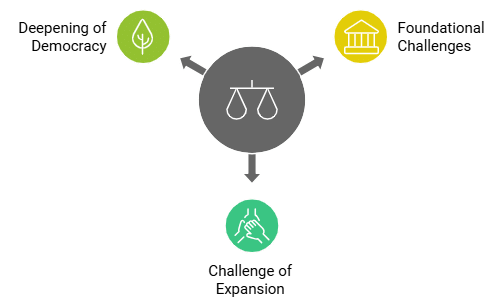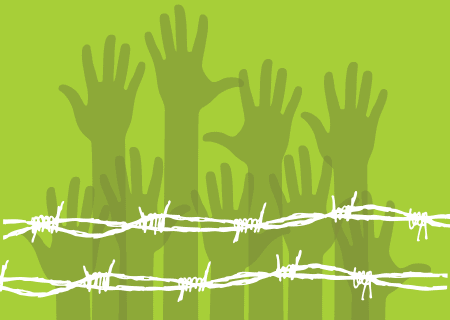Class 10 Civics Notes - Challenges to Democracy
THINKING ABOUT CHALLENGES AND POLITICAL REFORMS
- How do we define a challenge?
- A challenge means a situation that requires some action. It is a difficulty which has to be overcome.
- Broad challenges to democracy are—

(i) Foundational challenges: Some countries had to face the challenge of transition to the democratic style of government. They had to have laws and policies that would be followed in a democratic set-up.
(ii) Challenge of expansion: Countries which are already democratic face the challenge of expanding it to all social groups and regions. All institutions should follow democracy in their functioning.
(iii) Deepening of democracy: It means strengthening those institutions that have people’s
participation and control. It means bringing down the control of the rich and the powerful people in making government decisions. - Different countries have different challenges.
- Challenges to democracy have to be dealt at the local or state level. All reforms cannot be made at the national level.
- Devising ways and means for political reforms in India.
 Fig: Challenges faced by democracy
Fig: Challenges faced by democracy
A.(i) One way is legal reform, making new laws to ban undesirable things.
(ii) But legal-constitutional changes cannot overcome challenges to democracy.
(iii) The reforms have to be carried out mainly by political activists, parties, movements and politically conscious citizens.
B. Legal changes sometimes have a counter-productive result. But laws which empower people to carry out democratic reforms are best, e.g. the Right to Information Act.
C. Democratic reforms are spread or brought about through political practice. Main focus of political reforms is strengthening democracy.
D. While proposing a political reform, one should be very clear about who will implement it and how. Political parties and MPs will never vote for a legislation that is against their interests.
CASE STUDY
Political funding
Challenge: On an average, every candidate who contested the last Lok Sabha elections owned a property of more than one crore. There is a fear that only wealthy people or those with their support can afford to fight elections. Most of the political parties are dependent on money given by big business houses. The worry is that the role of money in politics will reduce whatever little voice the poor have in our democracy.
Reform proposals:
- The financial accounts of every political party should be made public. These accounts should be examined by government auditors.
- There should be state funding of elections. Parties should be given some money by the government to meet their election expenditure.
- Citizens should be encouraged to give more donations to parties and to political workers. Such donations should be exempt from income tax.
Reform Politics: One cannot blame politicians for all the ills of our country. The politicians are no more corrupt than government officials, contractors or any middle-class professionals, politicians, but get more publicity. Laws cannot stop politicians, if they want to be corrupt. Only people and politicians together can stop corruption in politics and overcome wrong practices (e.g. appeals to caste and community).
Redefining Democracy-
FAQs on Class 10 Civics Notes - Challenges to Democracy
| 1. What are the main challenges to democracy in contemporary societies? |  |
| 2. How does political polarization affect democratic processes? |  |
| 3. What role does misinformation play in undermining democracy? |  |
| 4. In what ways can civil liberties be threatened in a democratic context? |  |
| 5. How can citizens contribute to strengthening democracy in the face of these challenges? |  |















